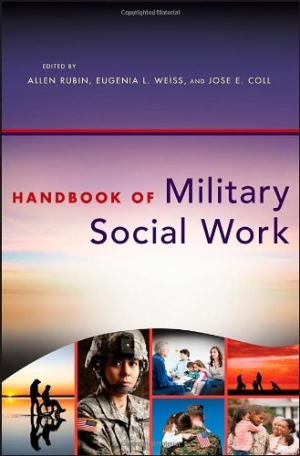Book Advises Social Workers on Treating Military Clients
January 07, 2013 / by Eric Lindberg- Research
A new textbook co-edited by USC School of Social Work clinical assistant professor Eugenia Weiss and several of her colleagues is among the first to outline how social workers can understand and address the unique challenges faced by military service members, veterans, and their families.
The Handbook of Military Social Work is designed to enhance the education and training of social workers and mental health practitioners who work with military and veteran clients and their families. Increasing the ranks of qualified professionals who can provide competent assistance to this unique population is critical, Weiss said, particularly as service members and veterans return from conflicts in Iraq and Afghanistan.
“Something is not working right if we have these horrendous suicide rates and family problems like domestic violence,” she said. “Social workers are uniquely suited to address those issues. We’re involved in every realm of health—social, emotional, psychological and environmental.”
The first section of the textbook highlights the history of social work in the military, various aspects of military culture and how to address common ethical issues when working with service members and veterans. Understanding military culture is a key component of successfully building a relationship with military populations, Weiss said.
“Military culture has its own values, norms, conduct and behavior,” she said. “If you don’t understand that culture, there’s no way you’ll be able to effectively assist or have the client willing to engage with you.”
The book then delves into behavioral health problems often experienced by service members and veterans, as well as existing evidence-based interventions for those issues, which include post-traumatic stress disorder, traumatic brain injury, suicide and substance use.
The third section provides an overview of the challenges faced by veterans as they transition to civilian life and includes strategies to prevent homelessness, help service members navigate government systems of care and receive benefits, and increase community involvement.
The fourth and final part of the textbook addresses issues faced by family members affected by military life, including problems related to stress, the deployment cycle, domestic violence and child maltreatment, and caring for a service member or veteran with a disability, not to mention the challenges faced by children from military families.
Weiss also noted there are unique aspects of serving in certain branches of the armed forces related to the all-volunteer nature of the military and its reliance on the National Guard and Army Reserve to bolster overseas efforts.
“National Guard and Reserve service members are out in the civilian communities, so they don’t have the ready support systems that active-duty services members have,” she said.
The book ends with a glossary of military-related terms and an extensive directory of resources for service members, veterans, and military families. Weiss also noted the textbook features numerous case vignettes and discussion questions to illustrate how to apply concepts in practice.
Although applicable to social workers employed by the government or armed forces, the textbook is focused on civilians who work in community agencies, mental health clinics and other settings where military personnel and veterans might seek assistance.
Weiss collaborated on the textbook with Allen Rubin, a social work professor at the University of Texas at Austin, and Jose Coll, an associate professor of social work at Saint Leo University.
“It is a wonderful way to collaborate and expand our ideas beyond the borders of Los Angeles,” Weiss said.
To reference the work of our faculty online, we ask that you directly quote their work where possible and attribute it to "FACULTY NAME, a professor in the USC Suzanne Dworak-Peck School of Social Work” (LINK: https://dworakpeck.usc.edu)
